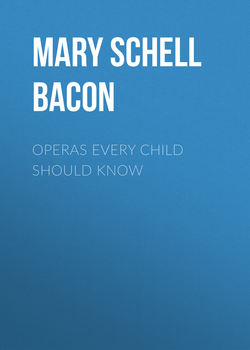Читать книгу Operas Every Child Should Know - Mary Schell Hoke Bacon - Страница 2
BALFE
ОглавлениеTHE story of The Bohemian Girl is supposed to have been taken from a French ballet entitled The Gipsy, which was produced in Paris in 1839. Again, it is said to have been stolen from a play written by the Marquis de Saint-Georges, which was named La Bohémienne. However that may be, it would at first sight hardly seem worth stealing, but it has nevertheless been popular for many decades. Balfe, the composer, had no sense of dramatic composition and was not much of a musician, but he had a talent for writing that which could be sung. It was not always beautiful, but it was always practicable.
The original title of La Bohémienne has in its meaning nothing to do with Bohemia, and therefore a literal translation does not seem to have been especially applicable to the opera as Bunn made it. The story is placed in Hungary and not in Bohemia, and the hero came from Warsaw, hence the title is a misnomer all the way around. It was Balfe who tried to establish English opera in London, and to that purpose he wrote an opera or two in which his wife sang the principal rôles; but in the midst of that enterprise he received favourable propositions from Paris, and therefore abandoned the London engagement. When he went to Paris, The Bohemian Girl was only partly written, and he took from its score several of its arias for use in a new opera. When he returned to London he wrote new music for the old opera, and thus The Bohemian Girl knew many vicissitudes off, as well as on, the stage.
The first city to hear this opera, outside of London, was New York. It was produced in America at the Park Theatre, November 25, 1844. The most remarkable thing about that performance was that the part of Arline was sung in the same cast by two women, Miss Dyott and Mrs. Seguin: the former singing it in the first act, the latter in the second and third. When it was produced in London, Piccolomini (a most famous singer) sang Arline and it was written that "applause from the many loud enough to rend the heavens" followed.
Because of this inconsequent opera, Balfe was given the cross of the Legion of Honour from Napoleon III., and was made Commander of the Order of Carlos III. by the regent of Spain. This seems incredible, for good music was perfectly well known from bad, but the undefined element of popularity was there, and thus the opera became a living thing.
A story is told of Balfe while he belonged to the Drury Lane orchestra. "Vauxhall Gardens" were then in vogue, and there was a call for the Drury Lane musicians to go there to play. The "Gardens" were a long way off, and there was no tram-car or other means of transportation for their patrons. Those who hadn't a coach had no way of getting there, and it must have cost Balfe considerable to go and come each day. He decided to find lodgings near the Gardens to save himself expense. He looked and looked, on the day he first went out. Others wanted the same thing, and it was not easy to place himself. However, by evening, he had decided to take anything he could find; so he engaged a room at an unpromising looking house. He was kept waiting by the landlady for a long time in the passageway, but at last he was escorted up to his room, and, being tired out, he immediately went to bed and to sleep. In the morning he began to look about, and to his horror and amazement he found a corpse stowed away in a cupboard. Some member of his landlady's family who occupied the bed had died. When he applied for the room, he had been made to wait while the previous occupant was hastily tucked out of sight. After that, he never hired lodgings without first looking into the cupboards and under the bed.
Balfe was a good deal of a wag, and his waggishness was not always in good taste, as shown by an incident at carnival time in Rome. His resemblance to a great patroness of his, the Countess Mazzaras, a well-known woman of much dignity, induced him upon that occasion to dress himself in women's clothes, stand in a window conspicuously, and make the most extraordinary and hideous faces at the monks and other churchmen who passed. Every one gave the credit of this remarkable conduct to the Countess Mazzaras. Balfe had pianos carried up to the sleeping rooms of great singers before they got out of bed, and thus made them listen to his newly composed tunes. He sometimes announced himself by the titles of his famous tunes, as, "We May Be Happy Yet," and was admitted, and received as readily as if he had resorted to pasteboard politeness.
In short, Balfe was never a great musician, yet he had all the eccentricities that one might expect a great musician to have, and he succeeded quite as well as if he had had genius.
Balfe was born May 15, 1808, and died October 20, 1870.
